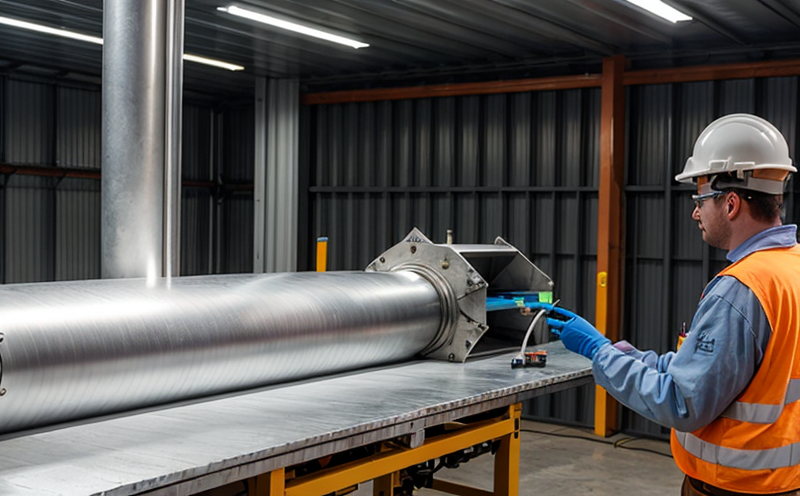ASTM E140 Hardness Conversion Testing of Renewable Energy Materials
The ASTM E140 hardness conversion testing is a critical process used to quantify the mechanical properties of materials, particularly in renewable energy applications. This service involves converting raw hardness values into standardized units that can be compared across different test methods and materials, ensuring consistency and reliability.
Hardness is an essential parameter for evaluating the performance of materials in various components used within renewable energy systems such as wind turbines, photovoltaic panels, and battery storage devices. The ASTM E140 standard provides a framework for converting hardness data from different testing methods into a single comparable scale, which is crucial for quality control and product development.
Our laboratory uses advanced testing equipment to perform ASTM E140 conversions accurately. We ensure that all specimens are prepared according to the specified standards, using precise sample preparation techniques to minimize variability in results. Our team of experts employs state-of-the-art instruments capable of delivering high-resolution data, providing accurate and reliable hardness values.
The conversion process involves several steps, including selecting an appropriate base hardness scale (e.g., Brinell, Rockwell), applying the correct conversion factors, and ensuring that all tests are conducted under controlled conditions. Our laboratory adheres strictly to these procedures to maintain accuracy and consistency in our results.
ASTM E140 is widely used in industries where precise material characterization is essential for quality assurance and compliance with regulatory requirements. By leveraging this standard, manufacturers can ensure their products meet stringent performance criteria, enhancing overall product reliability and safety.
We also offer additional services such as hardness testing using alternative methods like the Vickers or Knoop scales, which may be required depending on specific project needs or customer preferences. Our experienced technicians can guide you through the selection process to determine the most suitable method for your application.
Why It Matters
The importance of ASTM E140 hardness conversion testing cannot be overstated, especially in the context of renewable energy materials. Accurate hardness measurements are vital for ensuring that components perform optimally under various environmental conditions, from extreme temperatures and pressures to constant exposure to wind and sunlight.
- Enhanced Reliability: Consistent hardness values across different testing methods enable manufacturers to produce more reliable products. This consistency is particularly important in industries where failures can have significant financial and safety implications.
- Better Quality Control: By standardizing hardness measurements, ASTM E140 helps identify potential quality issues early in the manufacturing process, allowing for corrective actions before they become costly problems.
- Regulatory Compliance: Many regulatory bodies require compliance with specific material standards. Using ASTM E140 ensures that your products meet these requirements, avoiding potential legal and operational risks.
In summary, ASTM E140 hardness conversion testing plays a crucial role in maintaining high-quality standards within the renewable energy sector. It helps ensure that materials used in critical components are robust enough to withstand harsh conditions while meeting stringent performance criteria.
Quality and Reliability Assurance
The ASTM E140 hardness conversion testing is a cornerstone of quality assurance programs, providing precise and reliable data that supports the development and production of high-performance materials. Our laboratory ensures that all tests are conducted in accordance with international standards, ensuring accuracy and consistency.
Our team of experts follows strict protocols for sample preparation, including cleaning, polishing, and conditioning specimens to ensure they meet the required specifications. This attention to detail guarantees consistent results across multiple testing sessions and reduces variability due to improper specimen handling.
The use of advanced instrumentation further enhances our ability to deliver accurate hardness conversions. Our equipment is regularly calibrated to international standards, ensuring that all measurements are precise and repeatable. Additionally, we employ rigorous quality control measures throughout the entire testing process, from initial setup to final reporting.
By leveraging ASTM E140 hardness conversion testing, manufacturers can ensure their products meet stringent performance criteria, enhancing overall product reliability and safety. This standardization also facilitates better communication between suppliers, ensuring that all parties involved in a project are working towards the same goals.
Environmental and Sustainability Contributions
The ASTM E140 hardness conversion testing contributes significantly to environmental sustainability by promoting the development of more durable and efficient renewable energy materials. By ensuring that components can withstand harsh conditions, this service helps reduce waste and extend product lifecycles.
- Reduced Waste: Accurate hardness measurements allow manufacturers to design products with optimal material thicknesses, reducing unnecessary resource consumption and minimizing waste during production processes.
- Energy Efficiency: Robust materials enhance the efficiency of renewable energy systems by improving their ability to capture and convert energy. This leads to lower operational costs and reduced environmental impact over time.
- Resource Conservation: By selecting appropriate hardness levels, manufacturers can optimize material usage, conserving resources and reducing reliance on non-renewable materials.
In addition to these direct benefits, ASTM E140 also supports broader sustainability goals by fostering innovation in the development of sustainable technologies. Through accurate measurement techniques, researchers and developers can identify areas for improvement and explore new approaches that enhance both performance and environmental impact.





